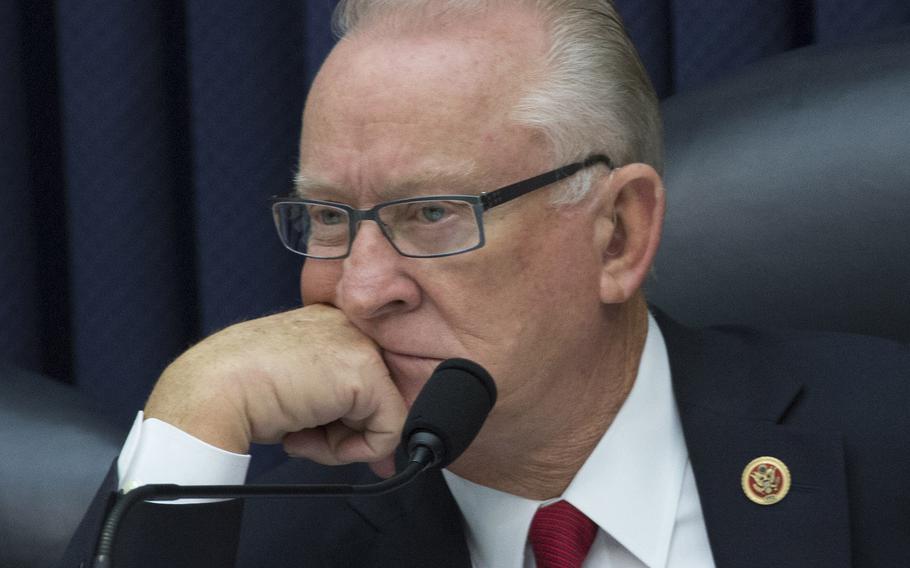
House Armed Services Committee Chairman Howard "Buck" McKeon, R-Calif., listens to testimony during a hearing on DOD's fiscal year 2015 Overseas Contingency Operations budget request, at the Rayburn Building in Washington, D.C., July 16, 2014. (Joe Gromelski/Stars and Stripes)
WASHINGTON — President Barack Obama’s decision to reverse course and seek a congressional authorization for the war against the Islamic State has so far served only to reignite criticism of his entire military strategy against the extremists.
On Thursday, the chairman of the House Armed Services Committee said any authorization that bars ground troops — Obama has insisted Americans will not wage ground combat — would be dead on arrival in Congress. “I will not support sending our military into harm’s way with their arms tied behind their backs,” said Rep. Howard P. "Buck" McKeon, R-Calif.
The day after the midterm elections, Obama appeared to change tack; saying he would welcome Congress’ input.
“I’m going to begin engaging Congress over a new authorization to use military force against ISIL,” he said. “The world needs to know we are united behind this effort and the men and women of our military deserve our clear and unified support.”
Meanwhile, about six competing authorization bills are now circulating on Capitol Hill and the White House has not yet told lawmakers what it expects from the new war authority, despite requests from congressional leaders. The lack of direction is making the process more difficult, said Sen. Tim Kaine, D-Va., who sponsored one of the bills.
“This works so much better when the president sends up the draft authorization,” Kaine said during a discussion at the Wilson Center in Washington. “Because if he doesn’t … then you have six different authorizations put in. I put one in with basic authorizations and limitations but there are five other authorizations floating around.”
Kaine has argued that Congress is abdicating its duty under the Constitution to declare war by not voting on the Obama administration’s air and proxy war. His bill would lay out rules for humanitarian operations, counter-terror operations against Islamic State leaders, and the training of regional forces as well as include a sunset clause that would require lawmakers to revisit the use of force after one year.
In lieu of a White House draft, the chairman of the Senate Foreign Relations Committee Sen. Robert Menendez, D-N.J., is likely working on synthesizing various proposals into a “Frankenstein” bill, said Kaine, who sits on that committee.
Congress is under mounting pressure to weigh in on the new conflict and decide on parameters for Operation Inherent Resolve as the administration strategy evolves. This week alone, U.S. and coalition forces conducted 23 more air strikes in Iraq and Syria at a cost of about $8 million per day, a total of about $776 million since Aug. 8, to push back the Islamist radicals who have seized large swaths of those countries, according to the Department of Defense.
Joint Chiefs Chairman Gen. Martin Dempsey told the House Armed Services Committee on Thursday that the military is now considering limited deployment of ground troops to fight alongside Iraqi forces — despite assurances from Obama it would not happen.
The administration is now basing its legal justification for the war on authorizations passed by Congress in 2001 after 9/11 and in 2002 about six months before the invasion of Iraq.
Last week, Obama met with congressional leaders and said the old authority for war is out of date.
“We now have a different type of enemy. The strategy is different … So it makes sense for us to make sure that the authorization from Congress reflects what we perceive to be not just our strategy over the next two or three months, but our strategy going forward,” Obama said.
The White House did not provide comment for this report.
Jack Goldsmith, a Harvard Law School professor, said Wednesday that authorizations of war have almost always required the president to make the first move.
“If you look back at every single major authorization of force since World War II … they have only come about because the president insisted on it,” Goldsmith said.
More than 10 authorizations have occurred that way and it is likely an Obama draft would mean a quick response from Congress, he said.
“If he sent up a draft authorization tomorrow and said, ‘I want this in a month,’ that would get the job done,” Goldsmith said. “The question is going to be, if he does not make that move, if congress can do it on its own.”